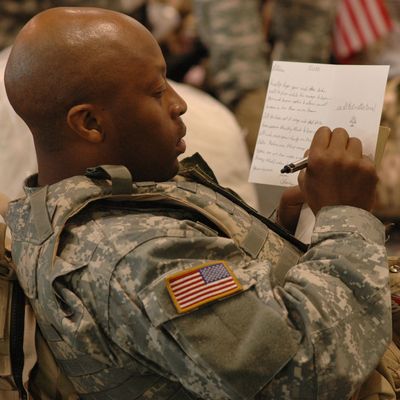
Researchers have an obvious, urgent interest in helping veterans readjust to civilian life. While it’s important to note that most returning veterans are able to transition smoothly out of the military, many do experience trouble of one sort or another — and in the worst cases, they face severe PTSD, depression, and other negative psychological outcomes.
There’s a clear need for programs addressing this population. The trick, though — or one of them — is getting veterans to actually participate. Part of the problem in designing programs for any group is that they need to both be effective and actually used by the intended targets — you can create the best anti-anxiety program in the world, but if uptake among anxious people is really low, it’s been a lot of wasted effort. This can be a particularly tricky problem among veteran populations, who often don’t seek out or have easy access to mental-health services.
This issue helped inform a new study in the Journal of Traumatic Stress led by Dr. Nina A. Sayer of the Minneapolis Veterans Administration Healthcare System. Sayer and her colleagues were interested in the way expressive writing — diving deep into your thoughts and feelings — might help returning veterans readjust, and one of the appeals of this approach is that it can be done from anywhere and doesn’t require veterans to actively seek mental-health care.
After recruiting veterans who said they’d had at least “a little” trouble “readjusting back into civilian life,” but who weren’t severely depressed — the authors note that past research suggests expressive writing doesn’t help this population — the authors set up a randomized controlled trial consisting of 1,292 veterans total. One set of veterans didn’t get any treatment; another did “factual” writing in which they were asked to write about what sorts of information should be provided to veterans, and to the general public about veterans; and members of the experimental group were asked “to explore their deepest thoughts and feelings about their transition to civilian life, including current challenges and reasons for these challenges.” Everyone in both writing groups was asked to complete four 20-minute writing sessions in an online module, though they had some flexibility about when they occurred, and everyone in the experiment was evaluated on various mental-health outcomes three and six months after the start of the experiment.
Overall, the researchers found a fair amount of evidence that expressive writing helped veterans — albeit with effect sizes that weren’t huge. As compared to the factual-writing control group, expressive writing was more effective “in reducing physical complaints, anger, and psychological distress.” But generally, the more noteworthy differences were between the writers and the nonwriters, regardless of the type of writing — the authors didn’t find as many outcome differences between expressive and factual writing as they were anticipating:
Overall, there were fewer than expected differences between expressive and factual writing, and effect sizes comparing expressive to factual writing were smaller than those comparing expressive writing to the no-writing treatment as usual control condition. It may be that the veteran-specific topics included in the factual writing condition evoked sufficient emotion or cognitive processing to improve certain outcomes. This may have been particularly true for the third factual writing session, where participants wrote about what the public should know about veterans returning from war. Thus, factual writing about meaningful topics may also confer beneficial effects. Alternatively, this may be accounted for by placebo effects associated with writing.
This is a classic example of how tricky it can be to figure out what’s going on in a given experiment. That is, is it that the factual writing, by dint of its subject, ended up tapping into some of the same sorts of emotions and thoughts as the expressive writing? Or is it that there’s just something helpful about writing, full stop?
And there’s another potential complicating factor here: The researchers informed the study participants that they’d be reading what they wrote “and follow-up only if participants wrote about plans to harm themselves or someone else; otherwise, participants would not receive feedback and their writing would remain confidential.” It’s almost certain that the researchers had to do this to get their experiment through an ethics board — it would be unethical to run an experiment in which a veteran wrote about suicidal thoughts but not direct them toward resources to help them deal with those thoughts. But it’s interesting to consider the effect it might have on a veteran to know that someone would be reading their writing, as compared to a situation in which, diary-style, a veteran knows that the writing is for their eyes only.
The researchers say they found “partial” support for their hypothesis about the benefits of expressive writing. But their study can also be seen as adding to the research pointing toward the overall therapeutic benefits of setting aside time to do personal writing. It might be a hard habit to get into — the authors note that, on average, their study participants completed less than three of the four assigned writing sessions — but there’s increasing evidence that it’s worth the effort.




